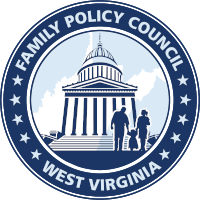Ordinance 348 (2025)
Ordinance 348 creates protections for individuals on the basis of sexual orientation, gender identity, and marital status by adding them to the list of classes recognized as under their ‘civil rights’ status.
It creates a private cause of action.
VOTE RESULT: YES
8 to 2
- OUR POSITION: NO
The Family Policy Council opposes this ordinance.
By criminalizing the shipping and unauthorized prescribing of abortifacients, it attempts to close legal loopholes that have allowed access to abortion-inducing drugs despite broader abortion bans in the state.
These prohibited acts include mailing, shipping, or otherwise delivering an abortifacient to anyone located in West Virginia; introducing abortifacients into the stream of commerce with knowledge they will be used in or sent to the state; prescribing abortifacients to West Virginia residents, even from outside the state; and disseminating such substances within the state without a valid prescription from a licensed medical professional.
The bill includes both criminal and civil penalties for violations. Any individual who is not a licensed medical professional and who knowingly and willfully violates these provisions is guilty of a felony and may be sentenced to a determinate term of imprisonment ranging from three to ten years.
In addition to criminal prosecution, the Attorney General of West Virginia is authorized to pursue civil actions against violators. These civil penalties may include injunctive relief as well as monetary damages of up to $150,000 per violation, and these civil actions may proceed without the need for a criminal indictment or conviction.
If a licensed medical professional is found by their licensing board to have knowingly and willfully violated this law, the board is required to revoke their medical license.
The law also provides a private right of action for pregnant women who receive an abortifacient unlawfully, allowing them to sue the violating party for injunctive relief and damages of $10,000 per abortion attempt.
Why We Oppose This Ordinance
Under § 30.07(c)(3) of Elkins Ordinance 348, all people are guaranteed the right to use public facilities—such as restrooms, showers, and locker rooms—without discrimination.
Because the ordinance lists “gender identity” as a protected class, this means that biological males who identify as female would be allowed to use female-designated spaces.
This rule would apply to any public accommodation within Elkins, including schools. Similar policies in other states have led to serious safety concerns.
In Loudoun County, Virginia, for example, a male student who identified as female was allowed access to the girls’ restroom and later sexually assaulted a female student. This happened on multiple occasions with different female students.
Incidents like this highlight the potential dangers of removing biological distinctions in intimate spaces.
No Exemption for Daycare Centers
Under Elkins Ordinance 348, secular daycares would be required to hire transgender employees, as any refusal based on gender identity would constitute discrimination under the law.
This means that even in settings involving young children, employers would have no legal authority to make staffing decisions that reflect parental expectations or traditional views on gender roles.
This represents an overreach of government power into private employment and childcare practices. It disregards the rights of parents who wish to have input over the moral and social environment in which their children are cared for.
By prioritizing ‘gender identity’ as a protected class, the ordinance places ideology above parental choice and community standards, potentially creating conflict between families and institutions that are simply trying to provide safe, values-consistent care for children.
Does Not Provide Religious Exemptions for Individuals
Although the Elkins ordinance provides a narrow religious exemption for churches and other religious organizations, it does not protect individual citizens or parents who object on moral or religious grounds.
It also offers no exemption for schools, which could require teenage girls to share showers and locker rooms with biological males.
This raises important questions about student safety, privacy, and the protection of individual conscience.
Burdensome to Marriage Counseling Centers
Under the “marital status” protection in Elkins Ordinance 348, businesses and organizations would be prohibited from making employment decisions based on whether a person is single, married, or divorced.
This means that even a marriage counseling clinic, whose purpose is to strengthen and preserve marriages, will be legally required to hire counselors who have been divorced.
This is both impractical and philosophically inconsistent. It undermines the freedom of a private business to uphold and model the very standards it teaches.
Forcing a marriage counseling center to employ individuals whose personal experiences may contradict its professional purpose of facilitating couples to develop lifelong commitment not only erodes organizational integrity but also represents a broader pattern of government intrusion into professional judgments.
In this sense, the ordinance substitutes bureaucratic equality for common sense, producing results that appear absurd when applied to real-world contexts. Except in situations directly related to marriage, it is difficult to imagine a common circumstance in which a person’s marital status would reasonably become an issue outside the counseling profession.

